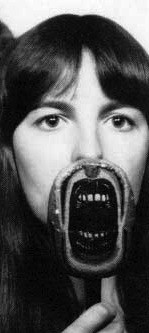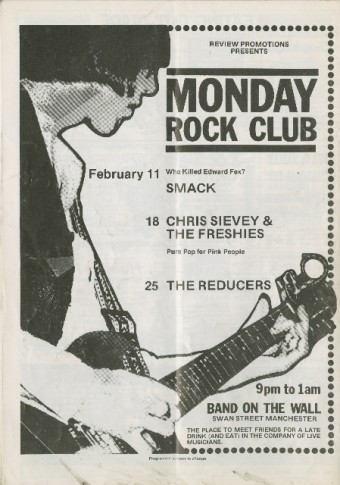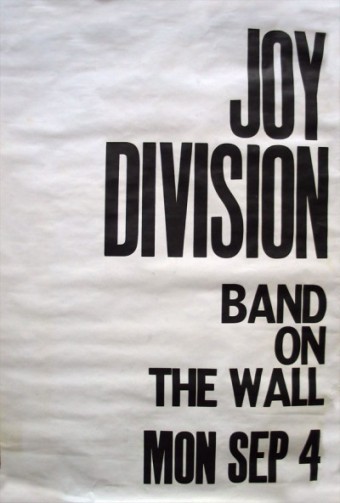New Manchester Review
New Manchester Review
Monday Rock Club at Band on the Wall between 1977 and 1979 became “the hippest night in town… a showcase for up and coming Manchester bands, especially more leftfield and less poppy ones.”(1) These weekly sessions were presented by the fortnightly magazine New Manchester Review, “a sort of Manchester version of Time Out but with a more left-leaning political edge.”
The NMR ‘Monday Club’ nights were truly seminal to the whole Manchester new music thing….
We hosted John Cooper Clarke doing a new poem/rant every interval between bands or sets, Joy Division performed there, as did virtually every band from the 1977–79 era, Buzzcocks etc., and I recall Sad Cafe did their music company signing there.
-Andrew Jaspan, former co-editor of the New Manchester Review and a founder of the Rock Club nights (2)
John Cooper Clarke reputedly gained his first fee for a gig there – a fiver.
According to Steve Forster (3) – Jaspan’s Review colleague and co-organiser of the promotions – the Band on the Wall on Mondays became “the place to be at this time, where deals were done. Reasons for this were that it was early in the week – less pressured than on a weekend, more relaxed — also the NMR provided a reason, a focus for more than musicians to be there, for politicians, entrepreneurs and those who wanted to get their face known.”
The Music
The first event organized by the New Manchester Review at Band on the Wall was the publication’s first birthday party, on 8 November 1976. The venue seemed an odd choice as it was exclusively run as a jazz club at that time (with the occasional blues aberration) and the headliners for the Review’s birthday bash were something of a jazzer’s nightmare: a brazen bunch of college boys from Bolton, the punk popsters, Buzzcocks. The programme also included singer-songwriter Tom McMasters whose band included future Joy Division producer Martin Hannett on bass.
On witnessing the performance by the outrageous and musically naïve Buzzcocks, Steve Morris, Band on the Wall’s genial venue manager, smiled paternally. A schooled musician who had devoted much of his life to mastering the intricacies of the clarinet, alto and soprano saxophones, Steve nonetheless would invariably encourage young musicians and performers to get up on stage, irrespective of their level of musical knowledge or technical abilities.
The first advert for the NMR nights promised:
A good times rock club…but also…All kinds of music and other diversions
Many of the Rock Club posters and flyers used a distinctive design template:
Monday Night Rock Club
The Review Monday gigs were from 8pm to 1 or 2am and admission was usually 50p.
The title of Rock Club did not constrain the programme bookers, Jaspan and Forster; from the outset there was much more than rock. The Grand Opening Night on 7 March 1977 included a country rock band, Pete Cowap with Country Rebel, also Cooper Clarke’s ranting poetry and an all-women clog band, the Poynton Jemmers. On 3rd October 1977 the programme was devoted to poetry, including Liverpool poet Adrian Henri (4) and Carol Ann Duffy, 32 years before she became Poet Laureate. (5)

Carol Ann Duffy
The Rock Club programme, according to Forster, was able to adapt easily to changes in the musical climate because most of the people making those changes were in the audience most weeks, be they musicians, managers, agents, hairdressers, flyposters or just busybodies. Among the music people who would attend the Monday Rock Club nights were: Martin Hannett; Mark E Smith, leader of the post-punk band The Fall that played the Rock Club on October 30, 1978, and was said by Radio DJ John Peel to be “the band against which all others are judged” and continues to perform; CP Lee, then of the comedy rock group Alberto y Lost Trios Paranoias, and now (2013) Head of Film Studies at Salford University, an institution that, according to his website, he has “put on the world map;” and members of Joy Division including the late Ian Curtis. The ‘Albertos’ would become regular entertainers at Band on the Wall in the 1980s.
Joy Division played more frequently on the nights organised by Manchester Musicians’ Collective at Band on the Wall but they made at least one Monday Rock Club appearance for NMR, September 4, 1978. This elementally simple, yet effective, poster for the date is reproduced courtesy of Manchester District Music Archive:
Steve’s Forster’s review of the gig reaches a puzzling conclusion:
Lead singer Ian Curtis has started to stay sober on stage and thus has lost the habit of shouting at no-one in particular between numbers. Obviously influenced by Lou Reed, The Doors and Iggy Pop, Curtis’s doom-laden vocals were effectively supported by the musicians – music for post-faschist take-over dissidents perhaps? (6)
Big In Japan played on Monday 13 February 1978 – they included future well-known musicians and organisers, Jayne Casey, who later was co-founder of Cream nightclub, Liverpool, and was artistic co-director of Liverpool’s opening weekend of Capital of Culture, Ian Broudie, of The Lightning Seeds, Holly Johnson, of Frankie Goes to Hollywood, and Bill Drummond, manager of Teardrop Explodes and later a member of KLF.
A total of over 100 different bands – most from Manchester and area – performed at Band on the Wall during the four years of the NMR Rock Club’s tenure at the venue. A few, such as Bicycle Thieves, Spider Mike King, Gyro, Gaffa and Gags played several times. Musically advanced, members of Bicycle Thieves included, on drums, multi-instrumentalist Dave Adams who would later tour with such diverse artists as Andy Sheppard, George Russell, Michael Ball & Tony Christie, and in London’s West End Shows has held keyboard and drum chairs, though, obviously, not simultaneously. Another member of the Bicycle Thieves was guitarist Richard Wright who would become a member of the resident weekend group at Band on the Wall in 1981 and subsequently embarked on a successful playing and teaching career in classical and contemporary music. From 2002-2004 he was Musical Director of the National Youth Guitar Ensemble and is now (2013) guitar tutor at the Yehudi Menuhin School of Music. The bassist with Bicycle Thieves, Ken Heggie, went on a similar career path, becoming a noted classical performer on guitar and mandolin, and guitar teacher. His orchestral commitments have included the Halle Orchestra, the Royal Ballet at Covent Garden and Glyndebourne Opera Touring. In the 1980s, he organised the music education programme at Band on the Wall and led its jazz-based outreach activities.
A Manchester band that was strongly backed by the New Manchester Review was Gags. Describing their gig at Band on the Wall on 26 Sept 1977, the reviewer wrote: (7)
Gags played a stunningly professional, tight set at BOTW enriched by the controlled dementia of Mr Bren Gore on keyboards, remember where you read it first.
The band never gained fame or fortune sufficiently for them to give up their day jobs but during a period of two decades they were the most popular Saturday night band at Band on the Wall, notching up a record 100 gigs at the venue and for five years, 1987-92, breaking all house records by averaging audiences of over 300. At the time, the capacity of the club was just 240 but in the 5 to 6 hours that the venue was open on weekend nights there was some turnover, with the door operating a one-out, one-in policy when queues formed in the street. This happened most nights when Gags were on the bill.
NMR at Rafters
Attendances at the NMR promotions were also generally good. But they were intended as fund-raisers for the magazine that often teetered on the edge of profitability and the limited attendance capacity at Band on the Wall restricted potential profits from the promotions. Consequently the organisers, Jaspan and Forster, looked for bigger premises for their promotions, while still retaining the Monday Club at The Band. They chose the 700-capacity Rafters in Oxford Road, creating Friday Club, and among the many artists they presented there were: Elvis Costello, Ian Dury, Magazine, Billy Idol, Generation X, Echo and the Bunnymen, Pere Ubu, The Clash, Wreckless Eric and John Martyn, described by Jaspan as “our biggest earner as he did three nights and sold out in a couple of hours.”
Closure of the Review
Steve Forster continues the story:
Money was always tight however at NMR and magazine and advertising sales struggled to keep up with rising costs and eventually it was decided to suspend publication…. The Monday gigs continued but, without the focus of the magazine, attendance gradually fell off, as they were doing on other nights at Band on the Wall.
The Monday Rock Club staggered on through 1980, then folded, along with the other NMR promotions. For four years and for an admission price of 50p-70p, the magazine had presented a fascinating array of mainly local talent, from ranting poets to clog dancers, punk rockers to jazz funksters, reggae toasters to blues shouters. Much more than rock, it had raised awareness of Band on the Wall as a venue for much more than jazz.








